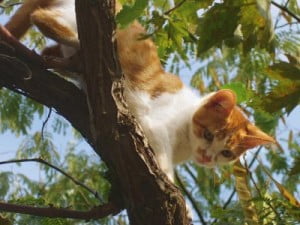Pet Advice Guides for Pet Owners
The Curiosity of Cats
 No, it’s not a myth – cats really are more curious about life than other animals.
No, it’s not a myth – cats really are more curious about life than other animals.
With so many cats around, our feline research programme has no shortage of information. One of our particular interests is why some cats are laid back couch potatoes and others are ‘curiosity cats’ who are only satisfied by by exploring and investigating everything they come across. These cats like the ‘wild life’ and are usually great hunters. Is this something they are born with? A gene from parents who are also survivalists? Do all cats have a curiosity streak that has, in some cases, been dampened down by their easy going existence with us?
These two middle aged ladies, Mischa and Myrtle, are mother and daughter. Myrtle was born here along with three other siblings who were re-homed. Mischa was in poor condition when she came in and had no desire to play or hunt. In fact she has never been a playful cat. She is most content to be waited on hand and paw!
Her daughter, Myrtle, on the other hand, has not had a poor start in life. Hers has been ease and privilege from day one. She is closely bonded with Mum and it’s lovely to see how fond they are of each other. Why isn’t she a hunter then? Or at least a playful individual. Is this laid back attitude a genetic trait that is handed down from generation to generation.
Our studies with other cats show to us that it isn’t just genes. A cat who is herself a good hunter will teach her kittens to hunt also. If kits aren’t taught how to catch mice, they won’t bother to do it. This is why farm cats are generally good mousers – it’s because they have the freedom and space to go out and catch lunch. They start by bringing dead prey back for the kits to eat and mum shows them how. Then they bring their catch back alive and show kittens how to kill. The last stage is to let their offspring kill for themselves. Cats, with their quick reactions and sharp teeth and claws, have a natural aptitude to do this but if they are confined indoors and their natural survival instincts are curbed, they won’t be able to pass this skill on to their young.
It’s the same at playtime. An active, feisty cat will show her kittens by example, how to chase leaves and feathers and climb up trees etc. A slow coach, whose only interest is when the next pouch is coming, won’t bother. The kittens won’t be so playful either. This behaviour can be modified by human interaction. Young cats can be taught to play by their human friends. I’m not so sure about climbing trees though!
The conclusion we’ve come to is that play and hunting is mostly down to conditioning and behaviour. All cats are naturally curious but it’s what they learn from their mommy that really counts.
